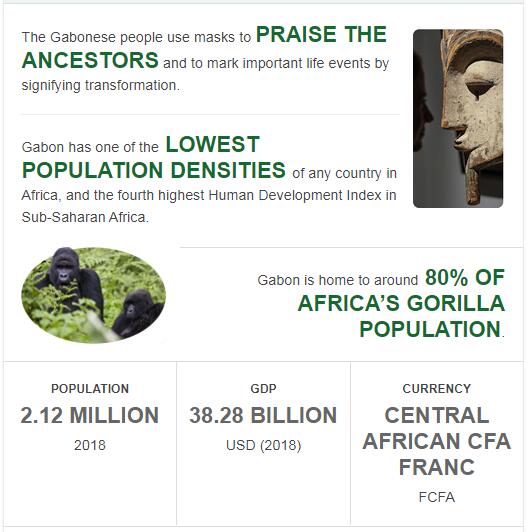The population of Gabon in 2017 was 2,222,741 people, with the majority living in urban areas. The economy of Gabon is largely based on oil and gas production, with a GDP of $22.6 billion and a relatively high per capita income. Gabon is a member of the United Nations, African Union (AU), International Monetary Fund (IMF) and World Bank. It has close ties to many countries throughout Africa as well as France who formerly colonized the country. In terms of politics, it is a unitary presidential republic with President Ali Bongo Ondimba as its head of state. The Prime Minister is Emmanuel Issoze-Ngondet who leads the Gabonese Democratic Party which has been in power since 2017. See militarynous for Gabon military and defense.
Yearbook 2017
Gabon. Gabon’s Constitutional Court announced in July that parliamentary elections would be conducted “by April 2018”. The election was actually held at the end of 2016 but was moved to July. The new delay was linked to disagreement between the government and parts of the opposition on proposed constitutional reforms. See ABBREVIATIONFINDER for frequently used acronyms and abbreviations related to as well as country profile of Gabon.
The critics felt that the president would have too much power. Jean Ping – a former top diplomat who considered himself the rightful winner in the disputed 2016 presidential election, as incumbent Ali Ben Bongo won by a few thousand votes – called for protests and received a time travel ban. The International Criminal Court (ICC) sent investigators to try to map the events in 2016. They found that the parties provided conflicting information, such as the number of casualties.
In March, Bongo held a national dialogue with opposition parties and individual organizations. Ping did not attend. But two of the opposition leaders later received high positions: one became vice president while Ping’s campaign general was appointed chairman of the Economic and Social Advisory Council.
According to Countryaah.com, the International Monetary Fund noted that Gabon’s growth in 2017 would be just under 1%. Dependence on oil exports continued, but slightly higher oil prices and timber and manganese exports were expected to contribute to stabilizing the economy. One concern was delayed payments on loans and to government suppliers, which could threaten the country’s creditworthiness.

History. – In the legislative elections of December 2006, the Parti démocratique gabonais (PDG) of President Omar Bongo – in power since 1967 and re-elected head of state in November 2005 with over 79% of the votes – largely confirmed itself as the country’s leading political force, winning 82 of the 120 seats in the National Assembly, Lower House of the Gabonese Parliament. Following the reported irregularities, the Constitutional Court ordered the annulment of the vote in 20 constituencies; for the assignment of these seats, consultations were held in June 2007 and the PDG was awarded 11 seats. The positive trend for the president’s party continued with the administrative elections of April 2008, in which the clear victory of the PDG was also facilitated by a very fragmented opposition. Omar Bongo, on which the NGO Transparency international – engaged in the fight against corruption – had requested the opening of an investigation for the diversion of public funds, died in June 2009; in the role of head of state he was succeeded by his son Ali, winner of the presidential elections of the following August. Despite allegations of fraud and irregularities by the other candidates, the recount confirmed the outcome of the consultations and led to the proclamation of Ali Bongo Ondimba as president with 41.79% of the votes. However, in January 2011, André Mba Obame – a former member of the PDG who later ran for the presidential elections as an independent winner of the presidential election of the following August. Despite allegations of fraud and irregularities by the other candidates, the recount confirmed the outcome of the consultations and led to the proclamation of Ali Bongo Ondimba as president with 41.79% of the votes. However, in January 2011, André Mba Obame – a former member of the PDG who later ran for the presidential elections as an independent winner of the presidential election of the following August. Despite allegations of fraud and irregularities by the other candidates, the recount confirmed the outcome of the consultations and led to the proclamation of Ali Bongo Ondimba as president with 41.79% of the votes. However, in January 2011, André Mba Obame – a former member of the PDG who later ran for the presidential elections as an independent – declared himself the winner of the competition and legitimate president of the country, calling his supporters to protest. His party, the Union nationale (UN), was dissolved by the Ministry of the Interior with immediate effect; MBA Obame took refuge in the United Nations offices in Libreville, the country’s capital. In the parliamentary elections of December 2011 – largely boycotted by the opposition – the PDG won 114 of the 120 seats, and in February 2012 a new government was installed with Raymond Ndong Sima as prime minister. This executive was then replaced in January 2014 and the post of premier was entrusted to Daniel Ona Ondo. In February 2015, the Union nationale was authorized to resume its political activity; MBA Obame – one of its founders – died in April after a long illness.
In international politics, the question remained open between Gabon and Equatorial Guinea for the control of the Mbagne, Conga and Cocotier islands, whose waters were supposed to be rich in oil.